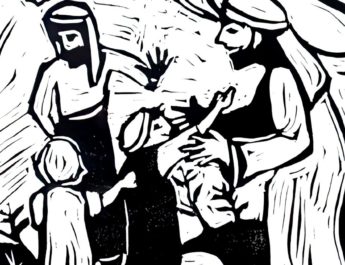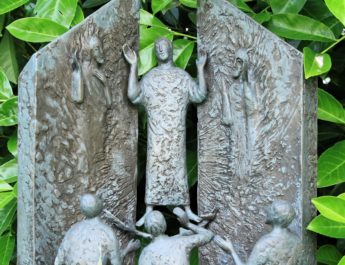2 Corinthians 6:16b-18
A Women’s Lectionary – Annunciation of the Lord
16 What agreementA has the templeB of GodC with idols?D For we are the temple of the livingE God;
A “agreement” = sugkatathesis. 1x in NT. From sugkatatithemi (to agree with, have accord with); {from sun (with, together with) + katatithemi (to deposit place down seek favor); {from kata (down, against, throughout, among) + tithemi (to put, place, set, fix, establish in a literal or figurative sense; properly, this is placing something in a passive or horizontal position)}}. This is agreement, alliance, or accord.
B “temple” = naos. From naio (to dwell, inhabit). This is a place for God (or a god) to live – a sanctuary, shrine, or temple. It is a place for God or a god to manifest. For the Jewish Temple, it is used of the Temple itself and the two inner chambers.
C “God” = Theos. From Proto-Indo-European origins, meaning do, put, place. This is God or a god in general.
D “idols” = eidolon. 11x in NT. From eidos (form, shape, sight, appearance); from eido (to be aware, see, know, remember, appreciate). This is image, idol, worship or an idol.
E “living” = zao. This is to live literally or figuratively. It is used for life including the vitality of humans, plants, and animals – it is life physical and spiritual and life everlasting.
as God said,
“I will liveF in them and walk amongG them,
and I will be their God,
and they shall be my people.H
F “live” = enoikeo. 5x in NT. From en (in, on, at, by, with) + oikeo (to settle or be established somewhere in a permanent way, to make a home or live at home); {from oikos (house – the building, the household, the family, descendants; the temple)}. This is to dwell in, whether remaining in a specific status or condition. It can also mean at home.
G “walk among” = emperipateo. 1x in NT. From en (in, on, at, by, with) + peripateo (to walk; foing from Hebrew figurative language, to walk referred to how you conducted your life, how you chose to live; most literally walking around; figuratively, living, behaving, following, how you occupy yourself); {from peri (about, concerning, around, encompassing) + pateo (to read, trample on; to trample literally or figuratively); {from patos (trodden) OR from paio (to strike, smite, sting; a hit like a single blow)}}. This is to walk around or among. It can be conversant with.
H “people” = laos. This is the people or crowd – often used for the chosen people. This is where the word “laity” comes from.
17 Therefore come outI fromJ them,
and be separateK from them, says the Lord,L
I “come out” = exerchomai. From ek (from, from out of) + erchomai (to come, go). This is to go out, depart, escape, proceed from, spread news abroad.
J “from” = mesos. Perhaps from meta (with among, behind, beyond; implies a change following contact or action). This is middle, among, center, midst.
K “be separate” = aphorizo. 10x in NT. From apo (from, away from) + horizo (to determine, set boundaries, appoint, designate, pre-determined; literally, this is setting horizons); {from the same as horion (boundary, territory); from horos (limit, boundary)}. This is to set off by a boundary – to divide, separate, exclude. It can also mean ostracize or keep aloof.
L “Lord” = Kurios. From kuros (authority, supremacy). This is a respectful address meaning master or sir. It refers to one who has control or power greater than one’s own. So, it was also applied to God and Jesus as Master or Lord.
and touchM nothing unclean;N
then I will welcomeO you,
M “touch” = haptomai. From hapto (to touch, handle, kindle, lay hold of). This is a touch that has an impact on what is being touched – it has an influence on the recipient so that the recipient is changed.
N “unclean” = akathartos. From a (not, without) + kathairo (to cleanse or purify by purging out unwanted elements); {from katharos (clean, clear, pure, unstained; clean in a literal, ritual, or spiritual sense; so, also guiltless, innocent or upright; something that is pure because it has been separated from the negative substance or aspect; spiritually clean because of God’s act of purifying)}. This is unclean or impure, whether a thing or a person. It is something that is not mixed with something that would taint. This is unclean in a ritual or moral sense. It can also mean demonic or foul.
O “welcome” = eisdechomai. 1x in NT. From eis (to, into, for, among) + dechomai (to warmly receive, be ready for what is offered, take, accept, or welcome; to receive in a literal or figurative sense). This is to receive favorably, welcome personally.
18 and I will be your father,P
and you shall be my sonsQ and daughters,R
says the Lord Almighty.”S
P “father” = Pater. This is father in a literal or figurative sense. Could be elder, senior, ancestor, originator, or patriarch.
Q “sons” = huios. This is son, descendant – a son whether natural born or adopted. It can be used figuratively for other forms of kinship.
R “daughters” = thugater. This is daughter, a related female or one who lives with you.
S “Almighty” = Pantokrator. 10x in NT – 1x in 2 Corinthians, 9x in Revelation. From pas (all, every, every kind of) + krateo (being strong or mighty so, by extension, to prevail or rule; to seize, grasp hold of, control; to arrest); {from kratos (strength, power, dominion; vigor in a literal or figurative sense; power that is exercised)}. This is almighty or omnipotent. It is the one who rules everything. It is always used of God.
Image credit: “Embrace” by Neil Carey, 2006.




